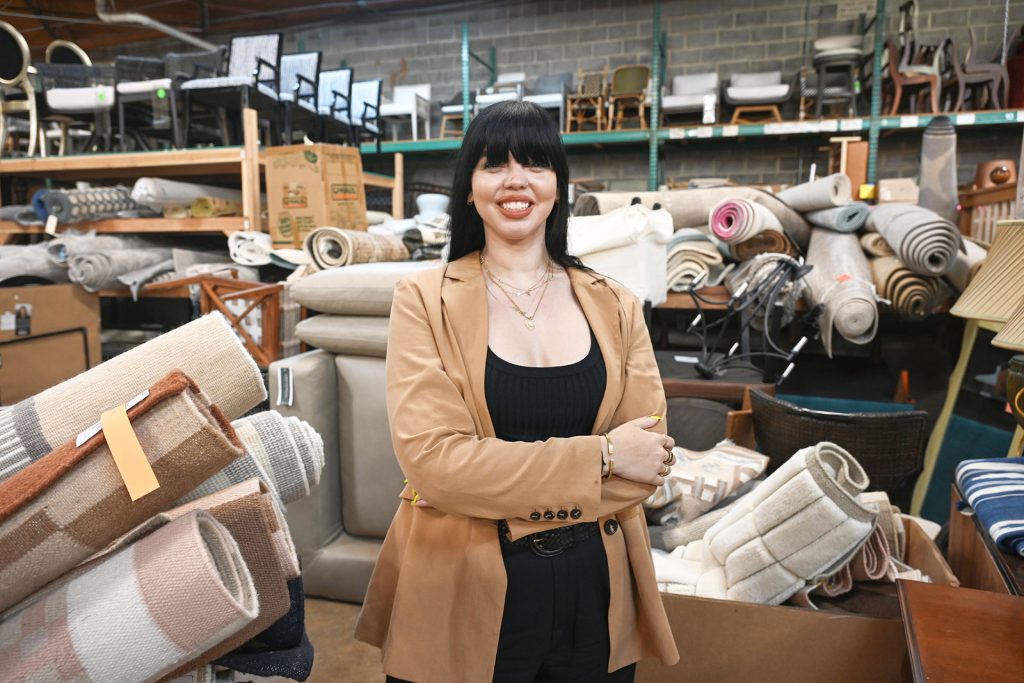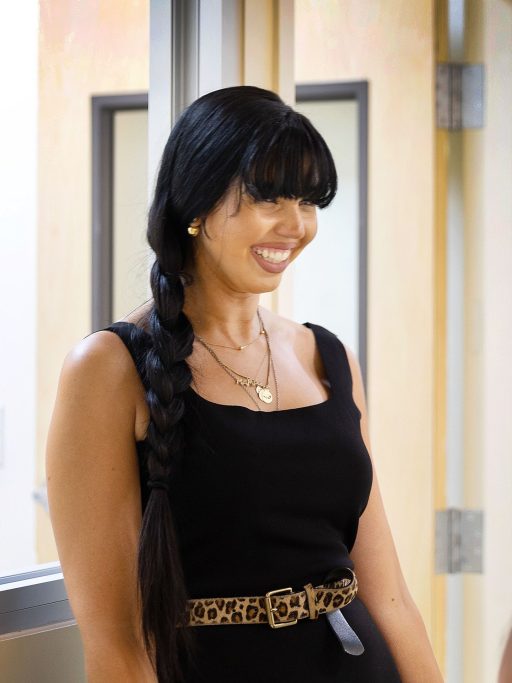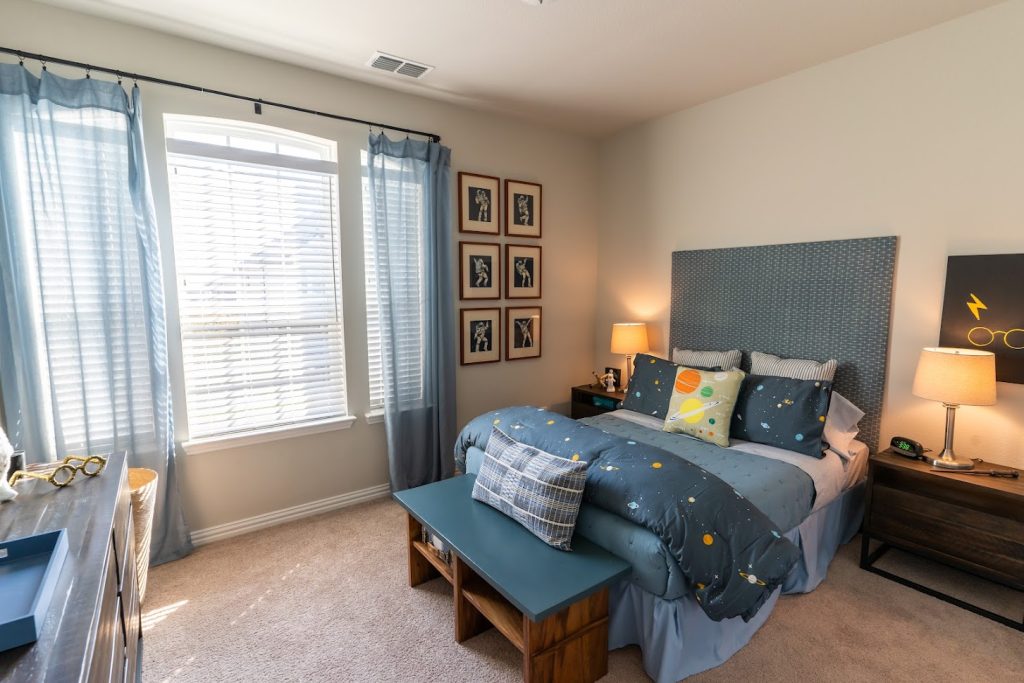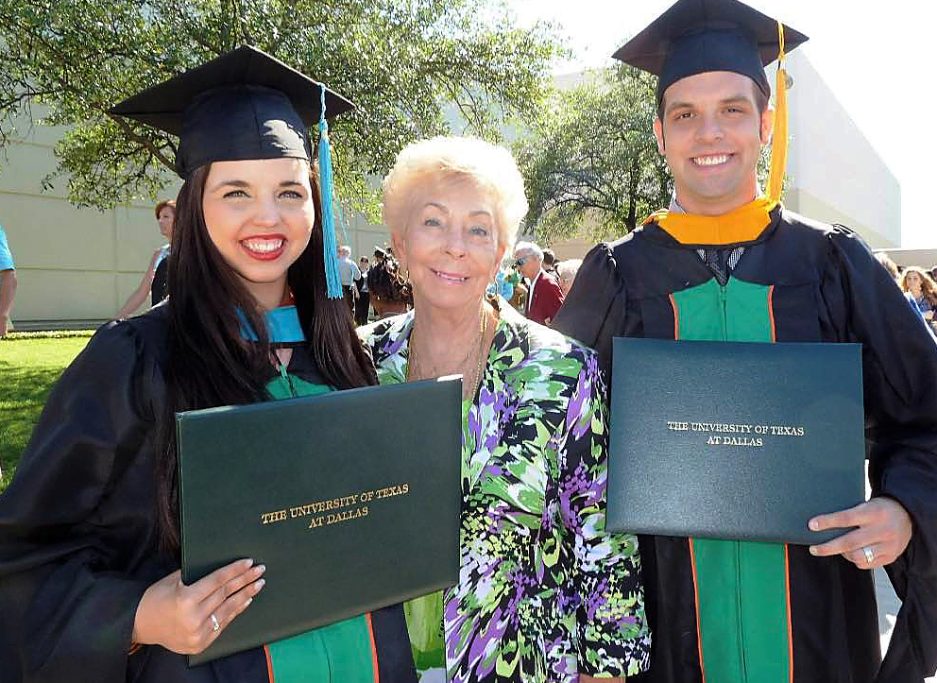Helping People Without Homes Gain Independence
By: Jeff Joiner | July 12, 2023

Ashley Noelle Sharp BA’09, MPA’11 is executive director of an unusual nonprofit organization that helps families struggling with housing. Dwell With Dignity in Dallas doesn’t provide a place to live for homeless people, though. Its staff and volunteers provide interior design services and furnishings to help once-homeless families turn a living space into a comfortable, stable home.
“A lot of people think of interior design as a nice to have, but not a need to have,” Sharp said. “But when you go into these homes, you’ll find children living on the floor, maybe sleeping on pool mattresses. Many of these families don’t have the resources to provide their children with things like beds and the first thing they want to do is take care of their children, to make them feel safe.”
Dwell With Dignity was founded by Dallas interior designer Lisa Robison in 2009. After a career working with a privileged clientele, she left the business to raise a family. Eventually she returned to design work, but for a very different client — those struggling to put a roof over their heads.
Robison was director of Dwell With Dignity until 2018 when she hired Sharp to run the business side of the nonprofit as executive director while she led the board of directors. Sharp enrolled in 2006 at UT Dallas at the age of 17 majoring in art and performance and business. After graduating from UTD, she enrolled in Southern Methodist University’s joint MA and MBA program in arts management but preferred her experience at UT Dallas and soon returned to her alma mater for graduate school.

“My graduate experience elsewhere was so anonymous and the number of people in the room just made me feel like a number,” Sharp said. “I had no relationship with my professors. At the master’s program at UT Dallas, they would text me if I wasn’t there, ‘Are you coming to class today?’ That’s the difference.”
After a semester at SMU, Sharp enrolled in the Master of Public Affairs program in the UT Dallas School of Economic, Political and Policy Sciences, where she graduated in 2009. After UTD, Sharp began a career working in nonprofit fundraising, working for the Dallas Symphony Orchestra and the Nasher Sculpture Center. She also worked for Interfaith Family Services, a transitional housing provider where she learned about Dwell With Dignity, soon taking the job as its executive director.
Sharp said Dwell With Dignity helps North Texas families by addressing many of the root causes of homelessness by giving their clients hope despite often-tragic circumstances. She recalls how Dwell With Dignity once helped a woman so abused by her ex-husband that she suffered a miscarriage. The woman came to Dwell With Dignity from a domestic violence shelter with her traumatized 6-year-old son.
After moving into an apartment furnished by Dwell With Dignity designers, the mom and her son knew they were finally safe.
“The moment the son saw he had his own bed, he just started jumping on it in a pure moment of joy,” Sharp said. “What’s so beautiful about her is that she now works for the shelter helping other women, Hispanic women specifically, get out of traumatic situations.”
Sharp said the story about the woman’s son is poignant because it shows how something as simple as a bed can make a difference to a family’s sense of well-being. For that reason, Dwell With Dignity makes sure that each person they help has their own bed, something that many children facing homelessness rarely have while living in temporary shelters.
Dwell With Dignity, which largely works with families with children under the age of 18, provides all the household furnishings, accessories and appliances they need to live a secure, stable life.
Once a family is determined to be qualified to receive help from Dwell With Dignity (a parent must have a job and be able to pay rent or receive help through Section 8 housing), staff designers meet with the family to find out what they would like and need in their home, including paint schemes, style of furnishings and even decorations like art.
“Our designers are licensed and trained,” Sharp said. “They are working with people coming out of trauma and they’re asking someone who’s gone through some of the most horrific things that you can go through in life to tell their story and open up to you. That’s not an easy thing.”
The designers learn how many children will live in the home, providing each not only with their own bed but also with a desk where they can do homework. They also provide a dining room table so families can eat together. They work with those with medical issues by providing ramps or other accessories to make the home accessible.

“We take all the financial burden off them to get them started — a hot meal, toiletries, furniture, appliances — everything you can think of,” Sharp said. “Families come to us from transitional shelters where they’ve lived for up to a year. When they move out, they have nothing to take with them, or just a few things provided by a nonprofit.”
Much of the furniture and appliances families receive comes from donations to Dwell With Dignity, which works with volunteers and staff who refinish and refurbish furniture in the organization’s Dallas warehouse. Donated items are also sold to raise money for its mission through the organization’s thrift store.
Dwell With Dignity works with more than 60 North Texas nonprofits that refer families needing help. To date, Sharp said, not a single family the organization has helped has returned to homelessness.
Recent services introduced by Sharp are design projects for community organizations. Beginning during the COVID-19 pandemic when Dwell With Dignity couldn’t work directly with people in their homes, Sharp started reaching out to organizations needing to refurbish communal spaces with the help of corporate sponsors. One group she recently helped is the Dallas County Juvenile Youth Center, where male juvenile offenders serve time in residential dorms rather than in the adult county correctional system.
“In one of the dorms that we renovated, the boys were basically living on yoga mats,” Sharp said. “My team went in and completely redid their space, and it is absolutely gorgeous. Each of them has their own bed with pillows and blankets and they’re taking care of the space because they have something to care for.”
Another community project involved creating a community center for the Jubilee Teen Center in West Dallas, a homeless shelter for Hispanic teens. Sharp and her team also refurbished a break room and kitchen in the Dallas Police Department’s 911 Communication Center in city hall. A similar project for the fire department’s dispatch center is in the works.
An upcoming project will take place on the UT Dallas campus where Dwell With Dignity is redesigning the Life Transition Closet at the Galerstein Gender Center. The closet is a source for used clothing and accessories needed by LGBTQ community members going through a life transition. The plan involves the reorganization of the closet’s inventory and involved input from a UTD senior capstone class in the Naveen Jindal School of Management taught by Sharp.
As a UTD alumna, Sharp has stayed close to her alma mater by working with not one but two Jindal School senior capstone classes, the second in a marketing class where students worked on branding and marketing ideas for Dwell With Dignity. She also serves on the board of the Center for Retail Innovation and Strategy Excellence and on the Diversity Advisory Council for UTD’s Office of Diversity, Equity and Inclusion. This year Sharp was nominated for Jindal School alumni of the year honors.

Sharp’s UTD education and nonprofit career has led her to combine two of her life’s passions — the arts and helping those in need. She said the ability to make permanent changes in the lives of Dwell With Dignity clients has been one of the most rewarding parts of her job.
“Because we stay in contact with our families, we are able to address root causes of homelessness,” Sharp said. “We’re literally starting at the bottom of their situations and working our way up to self-actualization — from mental health to building self-confidence.”